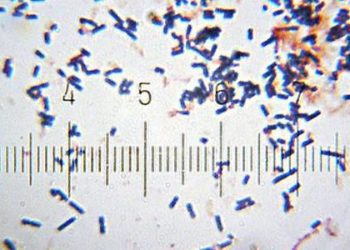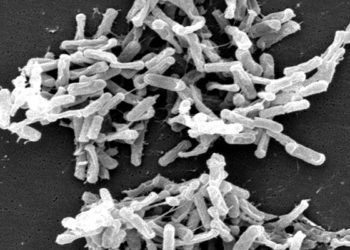Multispecies probiotic reduces overall risk of diarrhea in antibiotic-treated children
1. In a small randomized controlled trial, administration of a multispecies probiotic during antibiotic therapy and for 7 days afterwards significantly reduced risk of diarrhea from all causes compared to placebo.
2. Probiotic administration did not affect risk of antibiotic-associated diarrhea (AAD), defined as diarrhea either caused by C. difficile or without another identified pathogenic cause.
Evidence Rating Level: 1 (Excellent)
Study Rundown: Antibiotic-associated diarrhea (AAD) is a clinically significant complication of medical disruption of the gut microbiome. Probiotics have been heavily studied as preventive agents, but past studies have generally examined single-species probiotics. This multicenter randomized controlled trial including 350 children aimed to study the efficacy of a multispecies probiotic for the prevention of AAD in children. Subjects received either probiotic or placebo during antibiotic therapy and in the following 7 days. In children who had diarrhea, stool was tested for several common viral and bacterial causes of diarrhea. AAD was defined as diarrhea either caused by C. difficile or without a positive stool result for other pathogens. There was no significant difference in AAD rates between the study groups. However, children receiving probiotic were 35% less likely to develop diarrhea overall. Probiotic use was also associated with significantly lower risk of needing intravenous rehydration, though not with lower diarrhea duration, lower risk of C. difficile diarrhea, or other adverse events. These outcomes illustrate the importance of exact outcome definitions. Interestingly, the authors’ sensitivity analyses suggested that diarrhea due to rotavirus accounted for many of the cases prevented by probiotics. Despite the somewhat anomalous results, this study adds to the body of evidence in favor of probiotics to prevent diarrhea in the setting of antibiotic therapy. Multispecies probiotic agents may reasonably join single-species preparations in the pediatrics toolbox for this indication.
Click to read the study in JAMA Pediatrics
Relevant Reading: Benefaction of probiotics for human health: A review
In-Depth [randomized controlled trial]: Subjects between 3 months and 18 years old who were treated either inpatient or outpatient between 2018 and 2021 at several hospitals in the Netherlands and Poland were included. Of 350 randomized subjects, 37 were lost to follow-up. The first dose of twice-daily probiotic or placebo was given within 24 hours of starting a broad-spectrum oral or intravenous antibiotic and continued until 7 days after antibiotics were discontinued. The probiotic contained 8 strains of bacteria, and the dose was 10 billion colony-forming units (CFUs) per day. Caregivers recorded episodes of diarrhea; 83 children had diarrhea. Stool samples were not submitted for analysis for 17 patients with diarrhea; these patients were considered to have diarrhea but not AAD. A primary intention-to-treat analysis was used without imputation methods. The relative risk of diarrhea in the probiotic group as compared to placebo was 0.65 [95% confidence interval (CI) 0.44-0.94], for a number needed to treat of 9.
Image: PD
©2022 2 Minute Medicine, Inc. All rights reserved. No works may be reproduced without expressed written consent from 2 Minute Medicine, Inc. Inquire about licensing here. No article should be construed as medical advice and is not intended as such by the authors or by 2 Minute Medicine, Inc.







